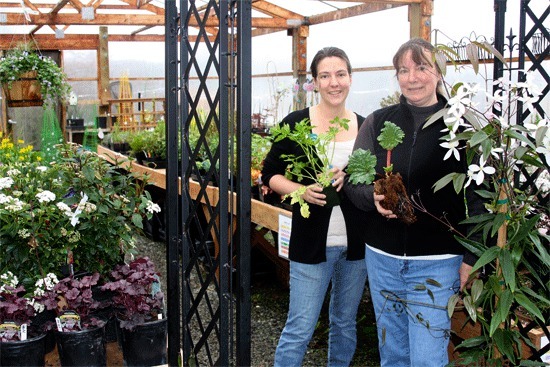We may not live in a buzzing metropolis, but this spring, all the buzz is about urban gardening.
Whether it’s because incomes are shrinking and people are downsizing, whether it’s because people are too busy to tend to larger spaces or whether it’s because it’s simply trendy, the desire for compact gardens has been popping up this month.
Sally Clifton, the owner of Sally’s Garden in Coupeville, said she’s noticed a significant increase in the amount of costumers coming in wanting to grow their own fruits and vegetables in containers rather than full-sized plots. She believes that the economy may have something to do with it. Food prices are rising as many families’ finances are forcing them to move into smaller homes that may not come with spacious property.
Clifton said yard-less folks are looking to planting containers to house their budding supply of grub. Containers have a number of advantages. Small pots need virtually no weeding and take less time to tend to while still having the ability to yield plump fruits and veggies.
And as nursery manager Catrina Glasl pointed out, the money-saving benefits of a home garden are huge. People could spend around $5 for a small jar of dried herbs at the grocery store, or could spend about $3 for seeds and have herbs for a lifetime — and fresh ones at that.
“You get so much quantity out of your plant,” Glasl said. “You’ll have more herbs than you know what to do with.”
Glasl recommends that novice gardeners who want to start growing their own food should start with herbs.
“Herbs are very hearty, easy to grow and people get instant gratification,” she said.
Additionally, Glasl said that homegrown food is often tastier than any ingredient picked up at a store.
She said stores often prioritize their produce picks by how long they can stay on shelves and how well they ship, so taste gets pushed to the bottom of the list.
“You never even know what a tomato tastes like until you grow it yourself,” Glasl said.
Other products recommended by the experts for the urban or downsizing gardener are combination and espalier trees. Sally’s Garden carries combination trees that grow four different types of apples, cherries or pears. Furthermore, the nursery just received “fruit salad trees” this year for the first time ever from its supplier in Mount Vernon. The fruit salad trees yield one type of apricot, one type of peach and two types of plums.
“It’s the first time I’ve seen anything like it,” Clifton said.
According to Clifton, combination trees are great because people can still get a variety of fruits without having to spend money on multiple plants. The self-pollinating trees cost between $39 and $59 and the nursery’s supply is mature enough that Clifton estimates they should produce fruit this season.
And the espalier trees, which also grow combinations of cherries, apples and pears, are designed to grow in tight spaces. Their branches are crafted to grow horizontally and resist the urge to spread wide.
“These are perfect for growing up against a deck,” Clifton said. … “This spring people are moving to practical rather than ornamental gardening.”
<strong>Sally’s Nursery</strong>
107 S. Main St.
Coupeville
360-678-9114
www.sallysgarden.com



